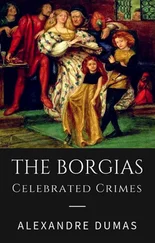Lucrezia, concerned by reports of the outbreak of the plague, decided to take her household to Modena both for her own sake — since her fluctuating temperature had induced her to consult her doctor, who advised her to leave the city — and for the sake of the child she was carrying. Her brother-in-law Giulio d’Este, Duke Ercole’s bastard son, asked if he might go with her. He was a rather tiresome young man, conceited, frivolous, quick-witted, and headstrong; but Lucrezia enjoyed his amusing company and so she readily assented. The old duke, well aware of the young man’s extravagance, had only granted him a modest allowance and had wanted him to go into the church. But Giulio had strongly resisted this plan and was much relieved when his brother, the new duke, presented him with a generous income as well as a palace.
Cardinal Ippolito was exasperated by the indulgence that Alfonso had shown to such a flighty and arrogant wastrel; and, as an opening gambit in the dispute that was developing between Ippolito and his illegitimate brother, he had a chaplain in Giulio’s household arrested and imprisoned. Giulio promptly broke into the prison and released the man.
The cardinal was a sardonic, elegant, supercilious, and argumentative man. He much regretted having been made a cardinal and certainly did not allow his unwanted eminence in the church to interfere with his passions for hunting and women. His outbursts of temper were notorious; on one occasion he flew into a rage with one of his father’s crossbowmen and had him beaten so savagely that he was almost killed. Lucrezia was intrigued by him, and she was seen so often in his company that the Roman ambassador in Ferrara reported that ‘she belonged to her husband at night, and to the Cardinal by day.’
Meanwhile, Lucrezia, accompanied by Giulio, was forced to leave Modena, where plague had by then also broken out, and made for Reggio, where they were intercepted by a messenger from Duke Alfonso with an order banishing Giulio to a remote estate. At first Giulio refused to go there, but eventually he was persuaded to leave, while Lucrezia induced the chaplain whom Giulio had released from prison to return there voluntarily for the moment.
Nor was this the only aspect of Giulio’s behaviour that was provoking such fury in his brother the cardinal. For months Giulio had been pursuing the pretty, alluring Angela Borgia, Lucrezia’s cousin; and when she became pregnant, it was generally supposed that he was the father of her child. Here was another problem for Lucrezia, for, while conducting an affair with Giulio d’Este, Angela was simultaneously being pursued by a besotted Cardinal Ippolito.
It was at Reggio on September 19, 1505, that Lucrezia gave birth to another child, a boy this time, who was named Alessandro in memory of her father. Bembo offered his congratulations. ‘It gave me infinite pleasure,’ he wrote, ‘to hear of the happy birth of a male child to your ladyship; all the more so,’ he added, after ‘the cruel disappointment and vain hopes’ that had accompanied her miscarriage of the previous year. He prayed also that this ‘dearly awaited son’ would grow into a man ‘worthy of so fine a mother.’ His hopes, and those of Alfonso and Lucrezia, however, were to be once again cruelly dashed. The infant proved poor and sickly; Alfonso sent his own doctor to Reggio to care for the baby, but despite his ministrations, barely a month later Alessandro was dead.
Writing to comfort Lucrezia, who had also suffered a bout of puerperal fever after the birth, Francesco Gonzaga, Marquis of Mantua, invited her to stay at Borgoforte, a castle on the border of Ferrara and Mantua that belonged to his family.
The thirty-nine-year-old Francesco was by no means a captivating personality, but his presence would be some comfort to Lucrezia after the departure of Giulio and the death of her baby. Besides, it would annoy Isabella d’Este, who was eight months pregnant, and whose discomfiture Lucrezia always found pleasurable. So she agreed to meet Gonzaga at Borgo forte, where, in his brusque and didactic way, he did his best to comfort and entertain her, even offering to send an envoy to Spain to hear news of Cesare; and when the time came to leave the castle, she wrote to Alfonso to tell him that she had been invited to accompany the marquis to Mantua on her way home to Ferrara. ‘I have been urged with such passion,’ she wrote to him, ‘to go tomorrow to visit the illustrious Marchioness, that, although I resisted strongly, I could not but obey.’
She had reason to be grateful for having done so. The Mantuan court possessed an enviable collection of works of art that Isabella was delighted to show her guest, books and jewels, enamels, glass and silver, and paintings not only by Perugino and Lorenzo Costa but also by Andrea Mantegna.
Mantegna, appointed court painter in 1460, had completed work on the Camera degli Sposi in the ducal palace in 1474, a project commissioned by Francesco’s grandfather, Marquis Lodovico. For Francesco himself, he had painted the nine huge canvases of the Triumph of Caesar , which were later bought by King Charles I and are now in the Orangery at Hampton Court. For Isabella, Lucrezia’s hostess, he had painted the Parnassus in 1497 and, three years later, the Triumph of Virtue , both now in the Louvre.
By the time he had finished work on the Triumph of Virtue , Mantegna was nearly seventy years old, a grumpy old man, by no means so well off as he thought he ought to be and in constant dispute with his neighbours. He was also in dispute with the illustrious Isabella over an antique bust of the Empress Faustina, which he had offered to sell her for 100 ducats, far less than he thought it was worth. Eventually, after treating the offer with disdainful silence, Isabella agreed to acquire it by settling the old artist’s debts up to that amount.
Lucrezia left Mantua at the end of October, having greatly annoyed the heavily pregnant Isabella by having so obviously aroused in her husband the passions and desires he was more in the habit of feeling for his wife’s maids-of-honour. Travelling in Francesco’s ceremonial barge, she arrived at Belriguardo, where she was greeted by Alfonso and by Giulio, his banishment rescinded by his indulgent half-brother.
A few days later, Giulio was returning to Belriguardo from a hunting expedition, riding along the road toward the villa, when he was met by a furiously jealous Cardinal Ippolito d’Este; he had been spurned, yet again, by the pretty Angela Borgia, who had scornfully told the cardinal that his brother’s liquid brown eyes were worth more to her than ‘the whole of your person.’ In an excess of rage, Ippolito now shouted orders to his four footmen to kill the man and put out his eyes, those eyes that Angela had told him she so extravagantly admired. Ippolito’s footmen obediently pulled Giulio from his saddle to the ground, where they stabbed at his eyes with their daggers until his face was covered with blood and his eyelids almost severed.
Ippolito rode back to Belriguardo with the news that he had found Giulio lying on the ground and wounded; the footmen fled abroad. Men were sent out to carry him back to the villa, and urgent summons were sent to surgeons at Ferrara. Giulio seemed to be on the point of death or, at least, blinded for life.
Cardinal Ippolito at first denied all responsibility for the incident; then he claimed that the four footmen were ‘formerly in our household.’ Alfonso, reluctant to have his own brother arraigned on a charge of murder, took care that this version of the events was sent to every court in Italy, where it soon became the subject of gossip. In a private letter to Isabella, however, Alfonso confessed the terrible truth, begging his sister not to reveal the true details of ‘this shameful act’; Isabella replied that it was too late, that every barber in the market place knew what had really happened. Like Alfonso, she was also shocked; when Ippolito himself fled to Mantua hoping to find refuge at his sister’s court, she was so horrified by what he had done that he was soon forced to leave.
Читать дальше











